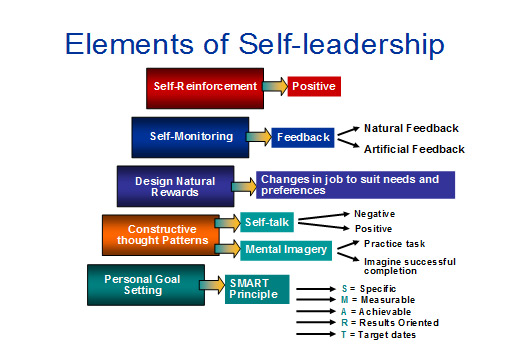Self-leadership has been more broadly defined as “the process of influencing oneself to establish the self-direction and self-motivation needed to perform a task”. Research across a variety of settings has shown that the practice of effective self-leadership by employees can lead to a number of benefits including improved job satisfaction, self-efficacy (your belief that you have the ability, motivation and resources to complete a task successfully), and mental performance.
Self-Leadership involves “leading oneself” via the utilization of both behavioral and mental techniques. The following can be seen as the elements of self-leadership:


These elements are key building blocks for self-leadership and a guide to achieving our individual goal.
Great insight… Believe it , achieve it.
Goal Setting is very Important – “SMART”